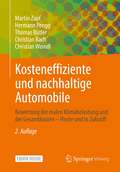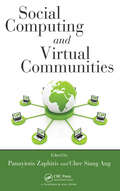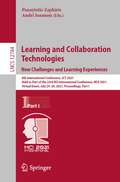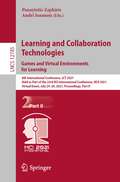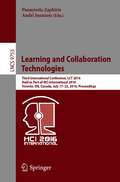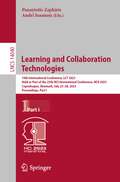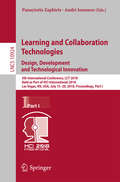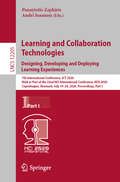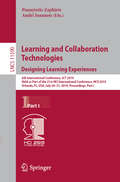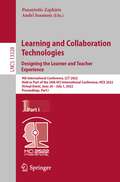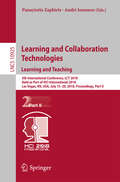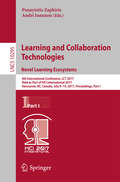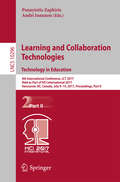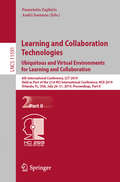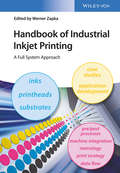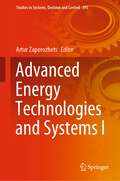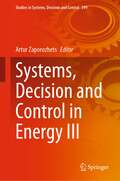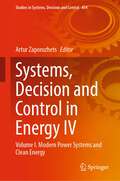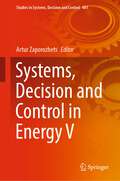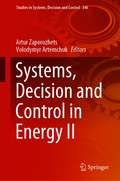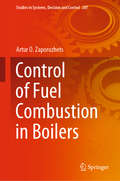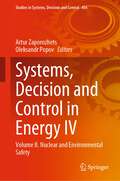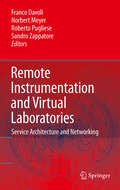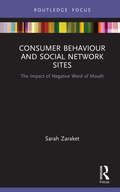- Table View
- List View
Kosteneffiziente und nachhaltige Automobile: Bewertung der realen Klimabelastung und der Gesamtkosten – Heute und in Zukunft
by Martin Zapf Hermann Pengg Thomas Bütler Christian Bach Christian WeindlIn diesem Buch werden für repräsentative Fahrzeuge mit unterschiedlichen Antriebskonzepten Gesamtkosten und Treibhausgasemissionen vorgestellt. Die Gesamtkosten sind zum einen aus Kundensicht, aber auch unabhängig von der nationalen Steuerbelastung ermittelt. Es werden sowohl fossile als auch erneuerbare Energieträger betrachtet. Auf Basis systemtheoretischer Grundlagen und wissenschaftlicher Erkenntnisse zum Klimawandel wird die Vorgehensweise entwickelt. Es kommen beispielsweise folgende Methoden zum Einsatz: Lebenszyklusanalysen, Total-Cost-of-Ownership, CO2-Vermeidungskosten und Verbrauchswerte, die Realverbräuche besser widerspiegeln als Normverbrauchswerte. Letztere sind anhand von Verbrauchsfunktionen (Willans-Ansatz) für unterschiedliche Fahrprofile modelliert. Es wird zudem ein politisches Instrument vorgestellt, mit welchem die Temperaturziele des Abkommens von Paris möglichst treffsicher und kosteneffizient eingehalten werden können.
Social Computing and Virtual Communities
by Panayiotis Zaphiris Chee Siang AngDue to the advancement of the Internet, online communities are gaining increasing importance in the research community. Presented from a user's perspective, this book explores the diverse application areas of social computing and online communities. A significant portion of the text focuses on real-world case studies in which user behaviors, social mechanisms, and technological issues are investigated. Drawing from computer science, information systems, and social science, the book takes a multidisciplinary approach to evaluate virtual communities. It is useful for those who construct, moderate, and maintain online communities.
Learning and Collaboration Technologies: 8th International Conference, LCT 2021, Held as Part of the 23rd HCI International Conference, HCII 2021, Virtual Event, July 24–29, 2021, Proceedings, Part I (Lecture Notes in Computer Science #12784)
by Panayiotis Zaphiris Andri IoannouThis two-volume set LNCS 12784 and 12785 constitutes the refereed proceedings of the 8th International Conference on Learning and Collaboration Technologies, LCT 2021, held as Part of the 23rd International Conference, HCI International 2021, which took place in July 2021. Due to COVID-19 pandemic the conference was held virtually.The total of 1276 papers and 241 poster papers included in the 39 HCII 2021 proceedings volumes was carefully reviewed and selected from 5222 submissions. The regular papers of LCT 2021, Part I, are organized in topical sections named: Designing and Developing Learning Technologies; Learning, Teaching and Collaboration Experiences; On-line vs. in Class Learning in Pandemic Times.
Learning and Collaboration Technologies: 8th International Conference, LCT 2021, Held as Part of the 23rd HCI International Conference, HCII 2021, Virtual Event, July 24–29, 2021, Proceedings, Part II (Lecture Notes in Computer Science #12785)
by Panayiotis Zaphiris Andri IoannouThis two-volume set LNCS 12774 and 12775 constitutes the refereed proceedings of the 8th International Conference on Learning and Collaboration Technologies, LCT 2021, held as Part of the 23rd International Conference, HCI International 2021, which took place in July 2021. Due to COVID-19 pandemic the conference was held virtually. The total of 1276 papers and 241 poster papers included in the 39 HCII 2021 proceedings volumes was carefully reviewed and selected from 5222 submissions. The regular papers of LCT 2021, Part II, focus on Games and Gamification in Learning; Chatbots in Learning; AR, VR and Robots in Learning.
Learning and Collaboration Technologies: Third International Conference, LCT 2016, Held as Part of HCI International 2016, Toronto, ON, Canada, July 17-22, 2016, Proceedings (Lecture Notes in Computer Science #9753)
by Panayiotis Zaphiris Andri IoannouThis book constitutes the refereed proceedings of the Third International Conference on Learning and Collaboration Technologies, LCT 2016, held as part of the 18th International Conference on Human-Computer Interaction, HCII 2016, in Toronto, Canada, in July 2016, in conjunction with 14 thematically similar conferences. The 1287 papers presented at the HCII 2016 conferences were carefully reviewed and selected from 4354 submissions. The papers cover the entire field of human-computer interaction, addressing major advances in knowledge and effective use of computers in a variety of application areas. The papers included in this volume are organized in the following thematic sections: instructional design; interaction techniques and platforms for learning; learning performance; web-based, mobile and ubiquitous learning; intelligent learning environments; learning technologies; collaboration technologies; and cultural and social aspects of learning and collaboration technologies.
Learning and Collaboration Technologies: 10th International Conference, LCT 2023, Held as Part of the 25th HCI International Conference, HCII 2023, Copenhagen, Denmark, July 23–28, 2023, Proceedings, Part I (Lecture Notes in Computer Science #14040)
by Panayiotis Zaphiris Andri IoannouThis two-volume set of LCT 2023, constitutes the refereed proceedings of the 10th International Conference on Learning and Collaboration Technologies, LCT 2023, held as Part of the 24th International Conference, HCI International 2023, which took place in July 2023 in Copenhagen, Denmark.The total of 1578 papers and 396 posters included in the HCII 2023 proceedings volumes was carefully reviewed and selected from 7472 submissions. The papers of LCT 2022 Part I are organized in topical sections named: Designing Learning Experiences; Understanding the Learning Experience; Technology-supported Teaching; Supporting Creativity in Learning.
Learning and Collaboration Technologies. Design, Development and Technological Innovation: 5th International Conference, LCT 2018, Held as Part of HCI International 2018, Las Vegas, NV, USA, July 15-20, 2018, Proceedings, Part I (Lecture Notes in Computer Science #10924)
by Panayiotis Zaphiris Andri IoannouThis two-volume set LNCS 10924 and 10925 constitute the refereed proceedings of the 5th International Conference on Learning and Collaboration Technologies, LCT 2018, held as part of the 20th International Conference on Human-Computer Interaction, HCII 2018, in Las Vegas, NV, USA in July 2018. The 1171 papers presented at HCII 2018 conferences were carefully reviewed and selected from 4346 submissions. The papers cover the entire field of human-computer interaction, addressing major advances in knowledge and effective use of computers in a variety of applications areas. The papers in this volume are organized in the following topical sections: designing and evaluating systems and applications, technological innovation in education, learning and collaboration, learners, engagement, motification, and skills, games and gamification of learning, technology-enhanced teaching and assessment, computing and engineering education.
Learning and Collaboration Technologies. Designing, Developing and Deploying Learning Experiences: 7th International Conference, LCT 2020, Held as Part of the 22nd HCI International Conference, HCII 2020, Copenhagen, Denmark, July 19–24, 2020, Proceedings, Part I (Lecture Notes in Computer Science #12205)
by Panayiotis Zaphiris Andri IoannouThis two-volume set LNCS 12205 and LNCS 12206 constitutes the proceedings of the 7th International Conference on Learning and Collaboration Technologies, LCT 2020, held as part of the 22nd International Conference, HCI International 2020, which took place in Copenhagen, Denmark, in July 2020.The total of 1439 papers and 238 posters included in the 37 HCII 2020 proceedings volumes was carefully reviewed and selected from 6326 submissions.The papers in this volume are organized in the following topical sections: designing and evaluating learning experiences; learning analytics, dashboards and learners models; language learning and teaching; and technology in education: policies and practice. As a result of the Danish Government's announcement, dated April 21, 2020, to ban all large events (above 500 participants) until September 1, 2020, the HCII 2020 conference was held virtually.
Learning and Collaboration Technologies. Designing Learning Experiences: 6th International Conference, LCT 2019, Held as Part of the 21st HCI International Conference, HCII 2019, Orlando, FL, USA, July 26–31, 2019, Proceedings, Part I (Lecture Notes in Computer Science #11590)
by Panayiotis Zaphiris Andri IoannouThis two-volume set LNCS 11590 and 11591 constitutes the refereed proceedings of the 6th International Conference on Learning and Collaboration Technologies, LCT 2019, held as part of the 21st International Conference on Human-Computer Interaction, HCII 2019, in Orlando, FL, USA in July 2019. The 1274 full papers and 209 posters presented at the HCII 2019 conferences were carefully reviewed and selected from 5029 submissions. The papers cover the entire field of human-computer interaction, addressing major advances in knowledge and effective use of computers in a variety of applications areas. The papers in this volume are organized in the following topical sections: designing and evaluating learning experiences; theoretical and pedagogical approaches in technology-enhanced learning; cognitive and psychological issues in learning; and technology in STEM education.
Learning and Collaboration Technologies. Designing the Learner and Teacher Experience: 9th International Conference, LCT 2022, Held as Part of the 24th HCI International Conference, HCII 2022, Virtual Event, June 26 – July 1, 2022, Proceedings, Part I (Lecture Notes in Computer Science #13328)
by Panayiotis Zaphiris Andri IoannouThis proceedings, LCT 2022, constitutes the refereed proceedings of the 9th International Conference on Learning and Collaboration Technologies, LCT 2022, held as Part of the 24th International Conference, HCI International 2022, which took place in June/July 2022. Due to COVID-19 pandemic the conference was held virtually.The total of 1271 papers and 275 poster papers included in the 39 HCII 2022 proceedings volumes was carefully reviewed and selected from 5487 submissions. The papers of LCT 2022 are organized in topical sections named: Designing and Developing Learning Technologies; Learning and Teaching Online; Diversity in Learning; Technology in Education: Practices and Experiences.
Learning and Collaboration Technologies. Learning and Teaching: 5th International Conference, LCT 2018, Held as Part of HCI International 2018, Las Vegas, NV, USA, July 15-20, 2018, Proceedings, Part II (Lecture Notes in Computer Science #10925)
by Panayiotis Zaphiris Andri IoannouThis two-volume set LNCS 10924 and 10925 constitute the refereed proceedings of the 5th International Conference on Learning and Collaboration Technologies, LCT 2018, held as part of the 20th International Conference on Human-Computer Interaction, HCII 2018, in Las Vegas, NV, USA in July 2018. The 1171 papers presented at HCII 2018 conferences were carefully reviewed and selected from 4346 submissions. The papers cover the entire field of human-computer interaction, addressing major advances in knowledge and effective use of computers in a variety of applications areas. The papers in this volume are organized in the following topical sections: designing and evaluating systems and applications, technological innovation in education, learning and collaboration, learners, engagement, motification, and skills, games and gamification of learning, technology-enhanced teaching and assessment, computing and engineering education.
Learning and Collaboration Technologies. Novel Learning Ecosystems
by Panayiotis Zaphiris Andri IoannouThe two-volume set LNCS 10295 and 10296 constitute the refereed proceedings of the 4th International Conference on Learning and Collaboration Technologies, LCT 2017, held as part of the 19th International Conference on Human-Computer Interaction, HCII 2017, in Vancouver, BC, Canada, in July 2017, in conjunction with 15 thematically similar conferences. The 1228 papers presented at the HCII 2017 conferences were carefully reviewed and selected from 4340 submissions.The papers cover the entire field of human-computer interaction, addressing major advances in knowledge and effective use of computers in a variety of application areas. The papers included in this volume are organized in the following topical sections: multimodal and natural interaction for learning; learning and teaching ecosystems; e-learning, social media and MOOCs; beyond the classroom; and games and gamification for learning.
Learning and Collaboration Technologies. Technology in Education
by Panayiotis Zaphiris Andri IoannouThe two-volume set LNCS 10295 and 10296 constitute the refereed proceedings of the 4th International Conference on Learning and Collaboration Technologies, LCT 2017, held as part of the 19th International Conference on Human-Computer Interaction, HCII 2017, in Vancouver, BC, Canada, in July 2017, in conjunction with 15 thematically similar conferences. The 1228 papers presented at the HCII 2017 conferences were carefully reviewed and selected from 4340 submissions.The papers cover the entire field of human-computer interaction, addressing major advances in knowledge and effective use of computers in a variety of application areas. The papers included in this volume are organized in the following topical sections: STEM education; diversity in learning; learning analytics; and improving the learning and collaboration experience.The chapter 'The Quality of MOOCs: How to Improve the Design of Open Education and Online Courses for Learners?' is Open Access under a CC BY 4.0 license.
Learning and Collaboration Technologies. Ubiquitous and Virtual Environments for Learning and Collaboration: 6th International Conference, LCT 2019, Held as Part of the 21st HCI International Conference, HCII 2019, Orlando, FL, USA, July 26–31, 2019, Proceedings, Part II (Lecture Notes in Computer Science #11591)
by Panayiotis Zaphiris Andri IoannouThis two-volume set LNCS 11590 and 11591 constitutes the refereed proceedings of the 6th International Conference on Learning and Collaboration Technologies, LCT 2019, held as part of the 21st International Conference on Human-Computer Interaction, HCII 2019, in Orlando, FL, USA in July 2019. The 1274 full papers 209 posters presented at the HCII 2019 conferences were carefully reviewed and selected from 5029 submissions. The papers cover the entire field of human-computer interaction, addressing major advances in knowledge and effective use of computers in a variety of applications areas. The papers in this volume are organized in the following topical sections: mobile and ubiquitous learning; virtual reality and augmented reality systems for learning; and collaborative technology.
Handbook of Industrial Inkjet Printing: A Full System Approach
by Werner ZapkaUnique in its integration of individual topics to achieve a full-system approach, this book addresses all the aspects essential for industrial inkjet printing. After an introduction listing the industrial printing techniques available, the text goes on to discuss individual topics, such as ink, printheads and substrates, followed by metrology techniques that are required for reliable systems. Three iteration cycles are then described, including the adaptation of the ink to the printhead, the optimization of the ink to the substrate and the integration of machine manufacturing, monitoring, and data handling, among others. Finally, the book summarizes a number of case studies and success stories from selected areas, including graphics, printed electronics, and 3D printing as well a list of ink suppliers, printhead manufacturers and integrators. Practical hints are included throughout for a direct hands-on experience. Invaluable for industrial users and academics, whether ink developers or mechanical engineers, and working in areas ranging from metrology to intellectual property.
Advanced Energy Technologies and Systems I (Studies in Systems, Decision and Control #395)
by Artur ZaporozhetsThis book focuses on modern technologies and systems for solving problems in the energy sector. It is shown that bioenergy is one of the promising areas of energy development. The book collected the experience of scientists from many countries in the research of renewable energy. The advantages of renewable energy are general availability, renewability, environmental friendliness. The analysis carried out by the authors shows the current state of renewable energy in the world, its trends and prospects. New measuring systems are presented, which can become the basis for measuring the thermal characteristics of various types of fuels, including biofuels, insulating materials, enclosing structures, etc. System for monitoring of grainy biomass comminution with the use of genetic algorithms has been presented and described. New technologies for the construction of power plants based on renewable energy sources have been proposed and investigated.
Systems, Decision and Control in Energy III (Studies in Systems, Decision and Control #399)
by Artur ZaporozhetsThis book describes new energy saving methods and technologies for heat power engineering. The book is devoted to topical issues of energy and related industries. Leading Ukrainian scientists from both scientific institutes and educational universities took part in its creation. The research results are presented in 6 parts: electrical engineering, heat power engineering, nuclear power engineering, fossil fuels, cybersecurity and computer science, environmental safety. Results of regulating of operating modes and applicability of model checking technique in power systems are showed. Separate block of questions regarding the functioning of nuclear power plants, their waste and preventive measures of protection against negative effects on living organisms (including, for example, the Chernobyl nuclear power plant) is considered. The results of the peculiarities of the extraction, purification and use of fossil fuels are presented. In some chapters, presented the results on improving the cybersecurity of energy systems and its resilience to various threats, including the use of 5G technology. Traditionally for this series, issues of ecological safety, the impact of different energy systems on the environment and its protection are considered. A book is for researchers, engineers, as well as lecturers and postgraduates of higher education institutions dealing with energy sector, power systems, ecological safety, etc.
Systems, Decision and Control in Energy IV: Volume I. Modern Power Systems and Clean Energy (Studies in Systems, Decision and Control #454)
by Artur ZaporozhetsThe concept of "energy" includes methods for obtaining and using various types of energy for the needs of human society. Energy is one of the foundations for the development of modern society. The effectiveness of solving social, economic and technical problems, as well as the anthropogenic transformations of nature, is largely determined by energy production and the scale of energy production.Modern energy is not a separate industry, but it penetrates widely into other areas, in particular, chemical, transport, aerospace, construction, metallurgy, engineering, agriculture, etc. The energy sector is based on complex technical systems that are multicomponent, spatially distributed systems that during their operation are affected to a wide range of design and non-design thermomechanical loading conditions, the effects of aggressive fields and units, unauthorized influences (operator errors, terrorism, sabotage) and can reach various limit states.Complex technical systems are characterized by complex non-linear interactions between their constituent elements, complex chains (scenarios) of cause-effect relationships between hazardous, probabilistic events and processes that occur during their life. These scenarios can be implemented over complex ramified scenario trees.Ensuring the operational reliability, durability and safety of power equipment is a difficult task, which is associated with the organization of the reliability of control over the operation of power plants and ensuring optimal conditions for their operation. In this regard, we can distinguish a whole class of tasks related to the development of control systems, diagnostics and monitoring in the energy industry, which are presented in this book. Of particular relevance now is the use of UAVs in the energy sector.Particular attention must be paid to the environmental consequences of the operation of energy facilities, the main of which is significant environmental pollution in large cities and industrial areas.The development of environmental management information systems is the prerogative of the state, corporations and one of the main directions of the national informatization policy. A clearly debugged system of environmental monitoring gives a general idea of the features of the current ecological state, the main directions of state policy in the field of environmental protection, the use of natural resources and environmental safety. The methodology and hardware-software tools for monitoring the state of the environment presented in the monograph are effective tools for supporting decision-making in managing the environmental safety of the atmosphere during its technogenic pollution.
Systems, Decision and Control in Energy V (Studies in Systems, Decision and Control #481)
by Artur ZaporozhetsThe book consists of 8 parts: Energy Informatics, Electric Power Engineering, Heat Power Engineering, Nuclear Power Engineering, Renewable Power Engineering, Fuels, Transport, and Environmental Safety. The results presented in this book are aimed at solving some of the technical issues proposed by the Ukraine Recovery Plan and other important scientific and applied problems in the field of energy. Scientists from leading Ukrainian academic institutions and universities are working on this book.This book is for scientists, researchers, engineers, as well as lecturers and postgraduates of higher education institutions dealing with energy sector, power systems, ecological safety, etc.
Systems, Decision and Control in Energy II (Studies in Systems, Decision and Control #346)
by Artur Zaporozhets Volodymyr ArtemchukThis book examines the problems in the field of energy and related fields (chemical, transport, aerospace, construction, metallurgy, engineering, etc.) and consists of 4 subsections: Electrical Engineering, Heat Power Engineering, Cybersecurity and Computer Science & Environmental Safety. In the first section, authors pay attention to contemporary issues related to the development of the electric power industry, electrical engineering, the physics of electrical phenomena and renewable energy sources (such as solar energy and wind energy). The second section is devoted to modern problems in heat power engineering and considers modern means and methods that increase the efficiency and reliability of the functioning of heat power facilities. The third section is devoted to issues of cybersecurity of critical facilities, in particular energy facilities, as well as the development of computer science and the introduction of modern information and measurement systems in the energy sector. The fourth subsection deals with the problems of rational use of natural resources, accounting for emissions of harmful substances, environmental issues at energy facilities, as well as the development of a methodology for environmental safety. The book includes 21 chapters. A book is for researchers, engineers, as well as lecturers and postgraduates of higher education institutions dealing with issues of control, diagnosis and monitoring of energy facilities.
Control of Fuel Combustion in Boilers (Studies in Systems, Decision and Control #287)
by Artur O. ZaporozhetsThis book examines key issues in improving the efficiency of small and medium power boiler units by adding control systems for the fuel combustion process. The original models, algorithms, software and hardware of the system developed for controlling the fuel combustion process are presented. In turn, the book presents a methodology for assessing the influence of climatic factors on the combustion process, and proposes new methods for measuring the thermophysical characteristics, which require taking into account the concentration of oxygen in the air. The system developed here was implemented on a boiler of the NIISTU-5 type, which is widely used for heat power engineering in Ukraine and other Eastern European countries. Given its scope, the book offers a valuable asset for researchers and engineers, as well as lecturers and graduate students at higher education institutions dealing with heat engineering equipment.
Systems, Decision and Control in Energy IV: Volume IІ. Nuclear and Environmental Safety (Studies in Systems, Decision and Control #456)
by Artur Zaporozhets Oleksandr PopovIn recent years, the scale of environmental hazards has been growing, emergencies occur more often at special facilities, in particular nuclear power, the largest of which was the accident at the Chernobyl nuclear power plant in Ukraine on April 26, 1986. With the advent of nuclear power, it was believed that nuclear power reactors were safe enough, control and monitoring systems, protective screens and trained personnel would guarantee their trouble-free operation. There is also a trend now that nuclear power is "environmentally friendly" because it provides a reduction in greenhouse gas emissions with replacing power plants working on fossil fuels. Some countries, such as the United States, have recently classified nuclear energy as a renewable energy source. Despite this, nuclear power is potentially dangerous due to: - possible accidents at power plants, accompanied by the ejection of radioactive materials into the environment; - ejections of about 250 radioactive isotopes into the environment as a result of the operation of nuclear reactors; - emissions of 85Kr, which changes the electrical conductivity of the atmosphere. This gas behaves like a greenhouse gas in the atmosphere, thereby contributing to anthropogenic climate change on Earth; - pollution of the biosphere with plutonium; - radioactive waste is the most important cause of environmental hazard, which remains unresolved. Civilian nuclear power reactors operating throughout the world annually generate large amounts of low-, medium- and high-level radioactive waste. Radioactive pollution accompanies all parts of the complex production of nuclear energy: the extraction and processing of uranium, the operation of nuclear power plants, the storage and regeneration of fuel, which has a significant impact on the environmental friendliness of nuclear energy. In addition, up to 300 natural and technogenic emergencies are registered annually, as a result of which people die and great economic damage is caused. The main reasons for the occurrence of technogenic accidents and catastrophes and the strengthening of the negative impact due to the occurrence of natural and technogenic emergencies in Ukraine are: obsolete fixed assets, in particular for environmental purposes; large volume of transportation, storage and use of hazardous substances; the emergency state of a significant part of public utility networks; insufficient investment support for the process of introducing the latest resource-saving and environmentally friendly technologies in environmentally hazardous industries, primarily in the metallurgical, chemical, petrochemical and energy sectors; environmental problems associated with significant changes in the state of the geological and hydrogeological environment and caused by the closure of unprofitable mining enterprises and mines; unwillingness of economic subjects to take measures to prevent accidents and catastrophes at high-risk and potentially hazardous facilities.
Remote Instrumentation and Virtual Laboratories
by Sandro Zappatore Norbert Meyer Roberto Pugliese Franco DavoliAccessing remote instrumentation worldwide is one of the goals of e-Science. The task of enabling the execution of complex experiments that involve the use of distributed scientific instruments must be supported by a number of different architectural domains, which inter-work in a coordinated fashion to provide the necessary functionality. These domains embrace the physical instruments, the communication network interconnecting the distributed systems, the service oriented abstractions and their middleware. The Grid paradigm (or, more generally, the Service Oriented Architecture -- SOA), viewed as a tool for the integration of distributed resources, plays a significant role, not only to manage computational aspects, but increasingly as an aggregator of measurement instrumentation and pervasive large-scale data acquisition platforms. In this context, the functionality of a SOA allows managing, maintaining and exploiting heterogeneous instrumentation and acquisition devices in a unified way, by providing standardized interfaces and common working environments to their users, but the peculiar aspects of dealing with real instruments of widely different categories may add new functional requirements to this scenario. On the other hand, the growing transport capacity of core and access networks allows data transfer at unprecedented speed, but new challenges arise from wireless access, wireless sensor networks, and the traversal of heterogeneous network domains. The book focuses on all aspects related to the effective exploitation of remote instrumentation and to the building complex virtual laboratories on top of real devices and infrastructures. These include SOA and related middleware, high-speed networking in support of Grid applications, wireless Grids for acquisition devices and sensor networks, Quality of Service (QoS) provisioning for real-time control, measurement instrumentation and methodology, as well as metrology issues in distributed systems.
Tunable Micro-optics
by Hans Zappe Claudia DuppéPresenting state-of-the-art research into the dynamic field of tunable micro-optics, this is the first book to provide a comprehensive survey covering a varied range of topics including novel materials, actuation concepts and new imaging systems in optics. Internationally renowned researchers present a diverse range of chapters on cutting-edge materials, devices and subsystems, including soft matter, artificial muscles, tunable lenses and apertures, photonic crystals, and complete tunable imagers. Special contributions also provide in-depth treatment of micro-optical characterisation, scanners, and the use of natural eye models as inspiration for new concepts in advanced optics. With applications extending from medical diagnosis to fibre telecommunications, Tunable Micro-optics equips readers with a solid understanding of the broader technical context through its interdisciplinary approach to the realisation of new types of optical systems. This is an essential resource for engineers in industry and academia, and advanced students working on optical systems design.
Consumer Behaviour and Social Network Sites: The Impact of Negative Word of Mouth (Routledge Focus on Business and Management)
by Sarah ZaraketThis book provides a solid understanding of electronic word of mouth (eWOM) by taking the reader through the process of information diffusion from rumour generation in times of traditional word of mouth (WOM) to negative social eWOM and examining how consumers process it. Consumer Behaviour and Social Network Sites tackles different themes relating to negative eWOM. Drawing on both intensive scientific research and professional examples, it bridges the gap between the academic and professional worlds. The book contrasts negative social eWOM to traditional WOM while discussing the specificities of different social networking sites in diffusing such information. It looks at why and how consumers decide to create, share and react to negative social eWOM, suggesting that there are more reasons than are commonly presumed for consumers to articulate themselves on these platforms. It also provides an appreciation of web users' behaviours with regards to negative social eWOM and how it can alter their decision-making journey. The book concludes with several strategies and key takeaways to deal with and prevent negative social eWOM. Most books on WOM are purely professional and lack the theoretical contextualization of the issue. Moreover, they often provide insights on brand-to-consumer conversation but not consumer-to-consumer (C2C) communication. This short book provides marketing academics, students and practitioners with an important insight into these C2C communications that can potentially be harmful to brands.
